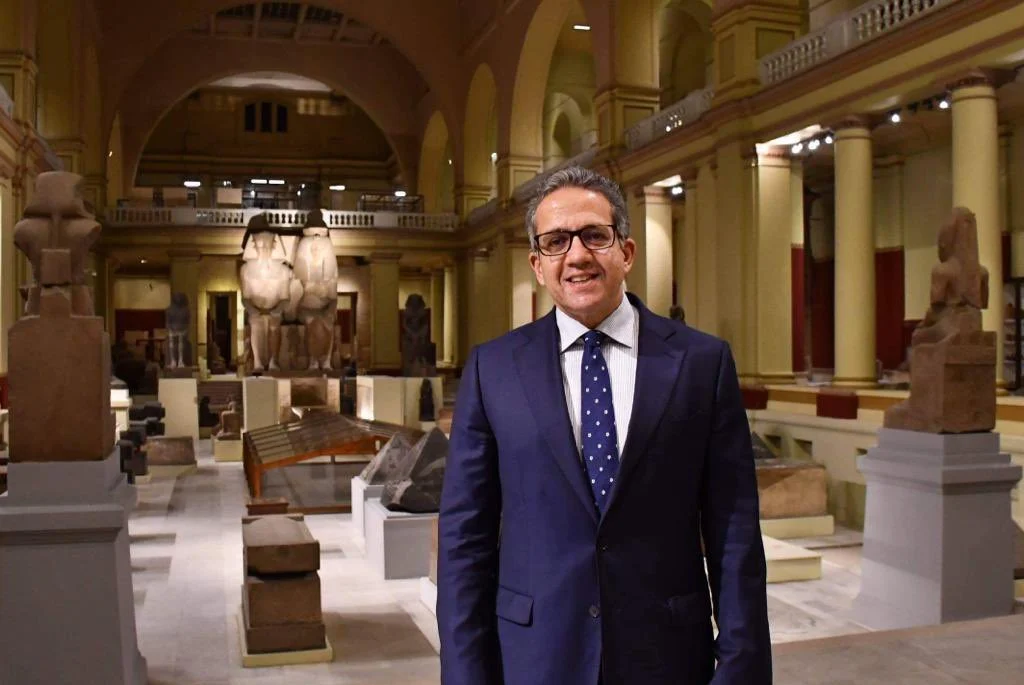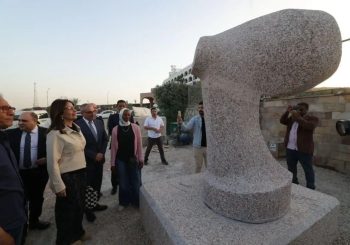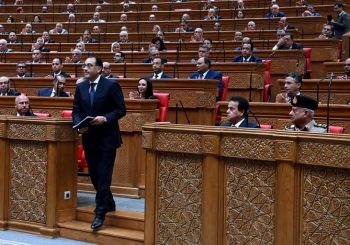Egypt’s former Minister of Tourism and Antiquities, Dr. Khaled El-Enany, has been elected as the new Director-General of UNESCO, succeeding France’s Audrey Azoulay after securing a majority of votes in the organization’s Executive Board elections in Paris.
His victory marks a historic moment: El-Enany becomes the first Arab and only the second African to lead the United Nations Educational, Scientific and Cultural Organization since its establishment in 1945.
A Scholar and Statesman
Born in 1971, Khaled Ahmed El-Enany is widely recognized for his extensive contributions to education, archaeology, tourism, and cultural diplomacy. Currently a professor of Egyptology at Helwan University, he has been part of Egypt’s academic community for more than three decades, teaching ancient Egyptian civilization and hieroglyphic writing both in Egypt and at leading international institutions.
El-Enany earned his master’s degree from Helwan University with a thesis on the temples of Ramses II in Nubia, before completing his doctorate in Egyptology at Paul Valéry University of Montpellier in France. He is fluent in Arabic, English, and French – a skill set that has long supported his efforts to foster dialogue across cultures and strengthen international cooperation.
For nearly fifteen years, El-Enany collaborated with the French Institute for Oriental Archaeology in Cairo. He was also elected as an honorary member of the French Society of Egyptology and a corresponding member of the German Archaeological Institute. His academic career has included leadership roles at Helwan University, where he served as Head of the Tourism Guidance Department, Vice Dean of the Faculty of Tourism and Hotels, and Director of the Open Education Center.
From Museums to Ministerial Leadership
Before entering government, El-Enany led both the National Museum of Egyptian Civilization and the Egyptian Museum in Cairo, where he spearheaded modernization and conservation initiatives that enhanced the global visibility of Egypt’s cultural heritage. In 2016, he was appointed Minister of Antiquities and later became Minister of Tourism and Antiquities, merging the two portfolios under a single ministry.
As minister, El-Enany oversaw more than two thousand archaeological sites and forty museums across Egypt. He was instrumental in restoring and reopening key heritage landmarks, including the Al-Azhar Mosque, Coptic churches, Jewish synagogues, and numerous historic palaces. His tenure witnessed the completion of more than fifty major restoration projects and the establishment of over twenty new museums across the country.
He also led the national committee responsible for repatriating stolen antiquities, overseeing the return of thousands of smuggled Egyptian artifacts from more than twenty countries. Among his most celebrated achievements were organizing the globally acclaimed Royal Mummies Parade in Cairo and the Avenue of the Sphinxes ceremony in Luxor, both of which showcased Egypt’s ancient legacy to the world.
Reform and Resilience
During his ministerial term, El-Enany introduced significant legislative reforms to protect Egypt’s cultural heritage and modernize the tourism sector. In 2022, he championed a law establishing the Tourism and Antiquities Support Fund to strengthen the ministry’s financial sustainability. He also played a leading role in formulating Egypt’s National Strategy for Sustainable Tourism and its Tourism Promotion Strategy, focusing on responsible growth, inclusivity, and accessibility for all.
His leadership during the COVID-19 pandemic and the Russia-Ukraine crisis drew widespread praise. Under his direction, the ministry implemented strict public health measures to protect visitors and employees, while extending humanitarian support to more than seventeen thousand Ukrainian tourists who had been stranded in Egypt until they safely returned home.
El-Enany worked consistently to ensure that culture remained accessible to all segments of society. He launched educational programs for children at museums and archaeological sites, supported initiatives to make heritage spaces more inclusive for people with disabilities and the elderly, and emphasized gender equality and youth empowerment within the ministry’s institutional reforms.
Global Recognition and Academic Impact
El-Enany’s distinguished career has earned him international recognition. In 2015, France awarded him the Order of Arts and Letters in the rank of Chevalier. In 2020, he received the Order of Merit from Poland, followed by Japan’s Order of the Rising Sun in 2021 for his contributions to cultural cooperation. In 2024, Paul Valéry University in Montpellier granted him an honorary doctorate in recognition of his academic and diplomatic achievements. That same year, the United Nations World Tourism Organization named him Cultural Tourism Ambassador, and he was decorated with France’s Ordre National du Mérite at the rank of Knight.
His candidacy for the top UNESCO position, announced by Egypt in 2023, gained strong support from both the African Union and the Arab League in 2024. Over a thirty-month campaign led by Egypt’s Ministry of Foreign Affairs, El-Enany positioned himself as a unifying figure capable of bridging divides across regions and disciplines.
Leading UNESCO into a New Era
El-Enany takes office at a pivotal time for UNESCO. The organization continues to face financial uncertainty following the United States’ withdrawal under the Trump administration, as well as broader geopolitical tensions affecting international cooperation. His leadership will be tested by the challenge of revitalizing UNESCO’s mission: protecting World Heritage sites, promoting education and gender equality, advancing scientific research in developing nations, and combating antisemitism and religious intolerance.
Backed by a broad coalition of Arab and African nations, El-Enany’s election is widely viewed as a diplomatic victory for Egypt and the wider Arab world. His extensive experience in heritage management, cultural policy, and multilateral engagement positions him to restore confidence in UNESCO’s global mission and strengthen the role of culture as a bridge for peace and mutual understanding.
For Egypt, his victory represents not only a source of national pride but also a symbolic achievement that underscores the country’s longstanding commitment to cultural preservation and international cooperation.







Comments (0)